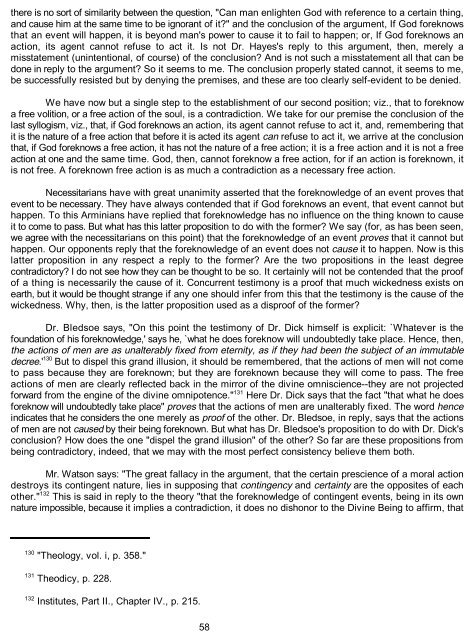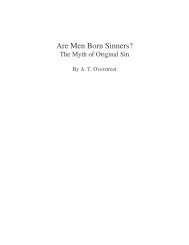Foreknowledge by Joel Hayes - Library of Theology
Foreknowledge by Joel Hayes - Library of Theology
Foreknowledge by Joel Hayes - Library of Theology
Create successful ePaper yourself
Turn your PDF publications into a flip-book with our unique Google optimized e-Paper software.
there is no sort <strong>of</strong> similarity between the question, "Can man enlighten God with reference to a certain thing,<br />
and cause him at the same time to be ignorant <strong>of</strong> it?" and the conclusion <strong>of</strong> the argument, If God foreknows<br />
that an event will happen, it is beyond man's power to cause it to fail to happen; or, If God foreknows an<br />
action, its agent cannot refuse to act it. Is not Dr. <strong>Hayes</strong>'s reply to this argument, then, merely a<br />
misstatement (unintentional, <strong>of</strong> course) <strong>of</strong> the conclusion? And is not such a misstatement all that can be<br />
done in reply to the argument? So it seems to me. The conclusion properly stated cannot, it seems to me,<br />
be successfully resisted but <strong>by</strong> denying the premises, and these are too clearly self-evident to be denied.<br />
We have now but a single step to the establishment <strong>of</strong> our second position; viz., that to foreknow<br />
a free volition, or a free action <strong>of</strong> the soul, is a contradiction. We take for our premise the conclusion <strong>of</strong> the<br />
last syllogism, viz., that, if God foreknows an action, its agent cannot refuse to act it, and, remembering that<br />
it is the nature <strong>of</strong> a free action that before it is acted its agent can refuse to act it, we arrive at the conclusion<br />
that, if God foreknows a free action, it has not the nature <strong>of</strong> a free action; it is a free action and it is not a free<br />
action at one and the same time. God, then, cannot foreknow a free action, for if an action is foreknown, it<br />
is not free. A foreknown free action is as much a contradiction as a necessary free action.<br />
Necessitarians have with great unanimity asserted that the foreknowledge <strong>of</strong> an event proves that<br />
event to be necessary. They have always contended that if God foreknows an event, that event cannot but<br />
happen. To this Arminians have replied that foreknowledge has no influence on the thing known to cause<br />
it to come to pass. But what has this latter proposition to do with the former? We say (for, as has been seen,<br />
we agree with the necessitarians on this point) that the foreknowledge <strong>of</strong> an event proves that it cannot but<br />
happen. Our opponents reply that the foreknowledge <strong>of</strong> an event does not cause it to happen. Now is this<br />
latter proposition in any respect a reply to the former? Are the two propositions in the least degree<br />
contradictory? I do not see how they can be thought to be so. It certainly will not be contended that the pro<strong>of</strong><br />
<strong>of</strong> a thing is necessarily the cause <strong>of</strong> it. Concurrent testimony is a pro<strong>of</strong> that much wickedness exists on<br />
earth, but it would be thought strange if any one should infer from this that the testimony is the cause <strong>of</strong> the<br />
wickedness. Why, then, is the latter proposition used as a dispro<strong>of</strong> <strong>of</strong> the former?<br />
Dr. Bledsoe says, "On this point the testimony <strong>of</strong> Dr. Dick himself is explicit: `Whatever is the<br />
foundation <strong>of</strong> his foreknowledge,' says he, `what he does foreknow will undoubtedly take place. Hence, then,<br />
the actions <strong>of</strong> men are as unalterably fixed from eternity, as if they had been the subject <strong>of</strong> an immutable<br />
130<br />
decree.' But to dispel this grand illusion, it should be remembered, that the actions <strong>of</strong> men will not come<br />
to pass because they are foreknown; but they are foreknown because they will come to pass. The free<br />
actions <strong>of</strong> men are clearly reflected back in the mirror <strong>of</strong> the divine omniscience--they are not projected<br />
131<br />
forward from the engine <strong>of</strong> the divine omnipotence." Here Dr. Dick says that the fact "that what he does<br />
foreknow will undoubtedly take place" proves that the actions <strong>of</strong> men are unalterably fixed. The word hence<br />
indicates that he considers the one merely as pro<strong>of</strong> <strong>of</strong> the other. Dr. Bledsoe, in reply, says that the actions<br />
<strong>of</strong> men are not caused <strong>by</strong> their being foreknown. But what has Dr. Bledsoe's proposition to do with Dr. Dick's<br />
conclusion? How does the one "dispel the grand illusion" <strong>of</strong> the other? So far are these propositions from<br />
being contradictory, indeed, that we may with the most perfect consistency believe them both.<br />
Mr. Watson says: "The great fallacy in the argument, that the certain prescience <strong>of</strong> a moral action<br />
destroys its contingent nature, lies in supposing that contingency and certainty are the opposites <strong>of</strong> each<br />
132<br />
other." This is said in reply to the theory "that the foreknowledge <strong>of</strong> contingent events, being in its own<br />
nature impossible, because it implies a contradiction, it does no dishonor to the Divine Being to affirm, that<br />
130<br />
"<strong>Theology</strong>, vol. i, p. 358."<br />
131<br />
132<br />
Theodicy, p. 228.<br />
Institutes, Part II., Chapter IV., p. 215.<br />
58






